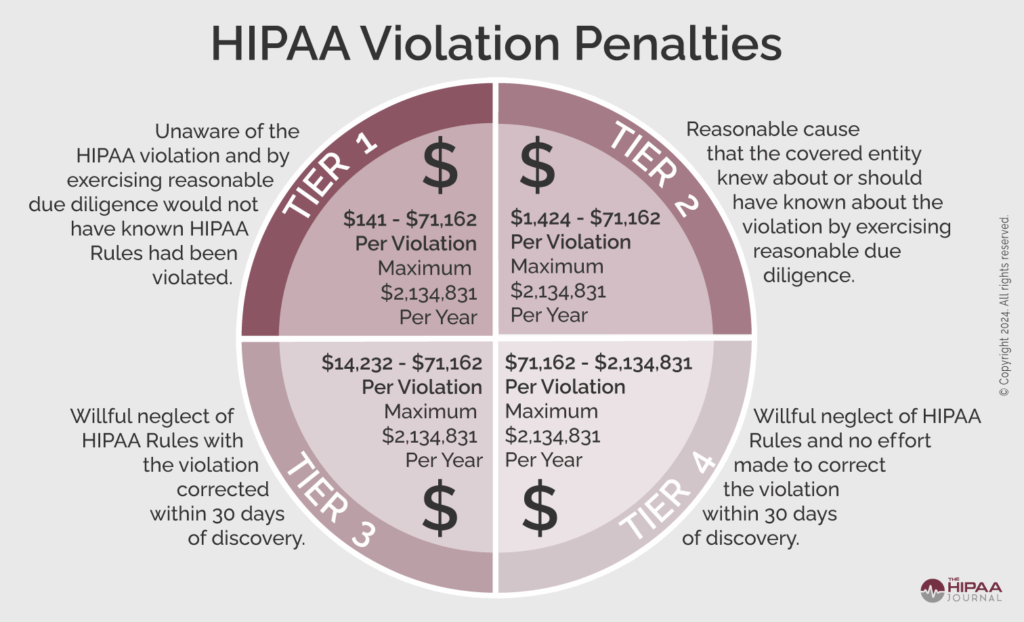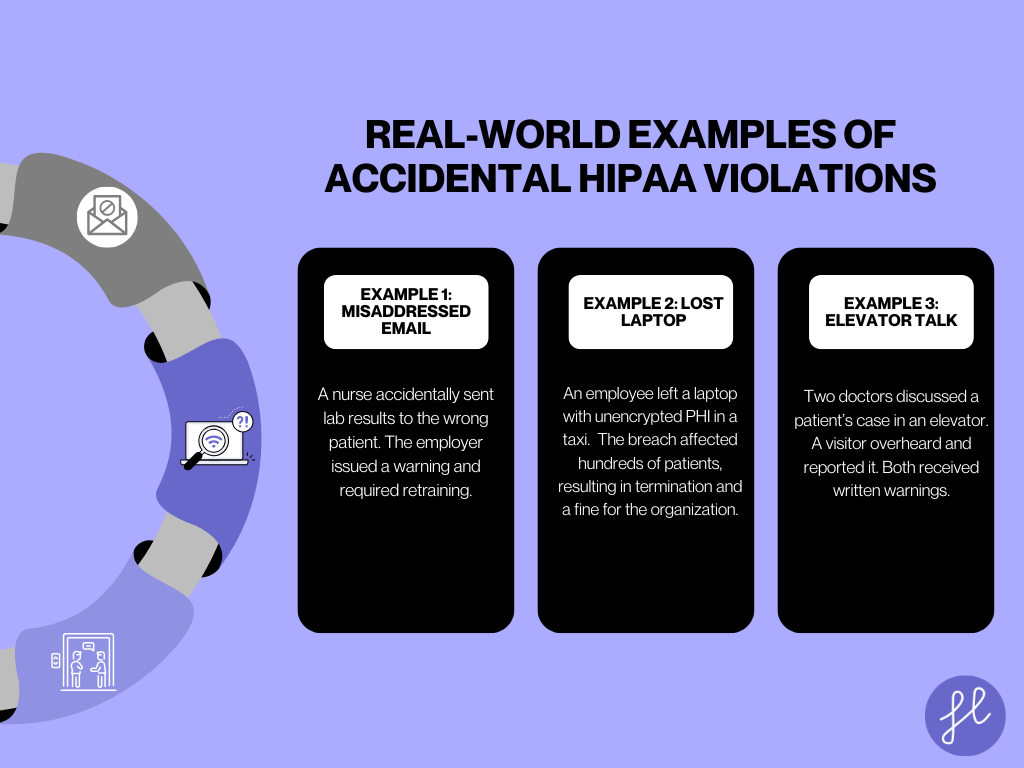The Health Insurance Portability and Accountability Act (HIPAA) is a cornerstone of patient privacy in the United States. It governs how healthcare providers, insurers, and their business associates handle protected health information (PHI).
But what happens if you accidentally violate HIPAA?
Can a simple mistake cost you your job?
In this guide, we’ll explore the legal, professional, and ethical implications of an accidental HIPAA violation. You’ll learn how employers typically respond, what protections may exist, and how to prevent future missteps.
HIPAA and Its Scope
The HIPAA Privacy Rule sets national standards to protect individuals’ health information (PHI). PHI includes any information that can identify a patient, such as names, birth dates, medical records, and billing details. This information can be stored or shared in various ways, including electronically, on paper, or verbally.
All “covered entities” (like health plans, healthcare providers, and clearinghouses) and their business partners must take steps to keep PHI safe. This includes implementing administrative, physical, and technical safeguards to prevent unauthorized access.
Employer Obligations and Enforcement
- Legal Duty: Covered entities are required to train their staff, assess risks, and have policies in place to reduce the chances of HIPAA violations.
- Zero-Tolerance Policies: Many organizations have strict rules that treat any unauthorized access to PHI, even if accidental, as a serious violation.
- Reporting Requirements: According to the HIPAA Breach Notification Rule, breaches affecting 500 or more individuals must be reported to the Department of Health and Human Services (HHS) and the media. More minor breaches need to be documented internally.
What Is a HIPAA Violation?
A HIPAA violation occurs when there is a failure to comply with any aspect of the HIPAA Privacy, Security, or Breach Notification Rules. These rules are designed to protect sensitive patient information and ensure it is not improperly disclosed or accessed.
Protected Health Information (PHI) includes:
- Names
- Addresses
- Social Security numbers
- Medical records
- Billing information
- Any data that can identify a patient
Violations can range from minor oversights to serious breaches involving thousands of records.
Types of HIPAA Violations
HIPAA violations fall into several categories, including:
1. Unauthorized Access
Accessing a patient’s record without a legitimate reason, even out of curiosity, is a violation.
2. Improper Disclosure
Sharing PHI with unauthorized individuals, even accidentally, breaches HIPAA rules.
3. Failure to Secure Data
Not using encryption or failing to lock screens can lead to unauthorized access.
4. Lack of Training
Employers are required to train staff on HIPAA compliance. A lack of training can lead to unintentional violations.
5. Improper Disposal
Throwing away documents containing PHI without shredding them is a common mistake.
Accidental vs. Intentional Violations
Not all violations are treated equally. The Office for Civil Rights (OCR), which enforces HIPAA, distinguishes between:
- Intentional Violations: Willful neglect or malicious intent, such as selling PHI.
- Accidental Violations: Unintentional mistakes, like sending a fax to the wrong number.
While both are violations, the consequences differ significantly.
Can You Be Fired for an Accidental HIPAA Violation?
The short answer is: Yes, you can be fired, even for an accidental HIPAA violation. However, whether you actually will be depends on several factors.
HIPAA itself does not mandate termination for violations. Instead, it leaves disciplinary actions to the discretion of the employer. Many healthcare organizations have internal policies that outline consequences for different types of violations.
Common Employer Responses:
- Verbal or written warning
- Mandatory retraining
- Suspension
- Termination
The severity of the response often depends on the nature of the violation and whether it’s a repeat offense.
Read more on HIPAA-Compliant Texting in Healthcare Communication
Factors Employers Consider Before Termination
Before making a decision, employers typically evaluate:
- Severity of the Breach: Was the PHI exposed to a wide audience? Was it sensitive or potentially harmful?
- Intent: Was the violation a genuine mistake or a willful act?
- History: Is this your first offense, or have you had previous issues?
- Impact: Did the breach result in harm to the patient or the organization?
- Reporting: Did you self-report the violation promptly?
Legal Consequences of HIPAA Violations
While termination is an employment matter, HIPAA violations can also lead to:
Civil and Criminal Penalties
- Tier 1: $100–$50,000 per violation (unaware of the violation)
- Tier 2: $1,000–$50,000 (reasonable cause)
- Tier 3: $10,000–$50,000 (willful neglect, corrected)
- Tier 4: $50,000+ (willful neglect, not corrected)
In rare cases, criminal charges may apply, especially for intentional misuse of PHI, fraudulent use of patient data, and selling PHI.

How to Protect Yourself from Accidental Violations
Avoiding accidental HIPAA violations requires vigilance and adherence to best practices.
- Double-check recipient information before sending emails or faxes
- Log out of systems when not in use
- Avoid discussing PHI in public or semi-public areas
- Use encrypted communication tools
- Attend regular HIPAA training sessions
- Report any suspected breach immediately
Real-World Examples of Accidental HIPAA Violations
Here are some examples of how an accidental HIPAA violation can happen in healthcare:

Best Practices for HIPAA Compliance
To avoid both accidental and intentional violations, consider implementing the following:
Administrative Safeguards
- Conduct regular risk assessments
- Develop and enforce privacy policies
- Train employees thoroughly
Physical Safeguards
- Restrict access to physical records
- Use secure storage and disposal methods
- Monitor facility access
Technical Safeguards
- Use strong passwords and two-factor authentication
- Encrypt all electronic PHI (ePHI)
- Monitor system access logs
FAQs
Yes, it’s possible. While many employers opt for retraining or warnings for first-time offenses, they are within their rights to terminate employment depending on the severity of the breach.
No. HIPAA does not provide job protection. It regulates how PHI is handled but leaves employment decisions to individual organizations.
Immediately report the incident to your compliance officer or supervisor. Prompt reporting can mitigate consequences and shows accountability.
Document the circumstances clearly, including what happened, when, and how. Cooperate fully with any internal investigation and demonstrate your commitment to compliance.
While criminal charges are unlikely for accidental violations, civil penalties may still apply. However, most accidental breaches are handled internally unless they result in significant harm.
Final Thoughts
An accidental HIPAA violation can have serious consequences, including termination. However, understanding the rules, staying vigilant, and following best practices can significantly reduce your risk. If you do make a mistake, honesty, transparency, and a willingness to learn can go a long way in preserving your career and reputation.